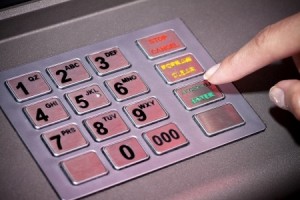Police say ‘mules’ with cloned ATM cards used to clean up bank accounts
MANILA, Philippines—Syndicates have started to deploy “mules’’ to withdraw cash using ATM cards cloned mostly in shopping malls, an official of the Police Anti-Cybercrime Group said Friday.
In the past years that it has been monitoring ATM fraud, the Anti-Cybercrime Group has investigated some people who admitted being paid by syndicates to withdraw cash with the use of cloned cards, the official said.
“Since they’re being monitored, they’re recruiting somebody to do it. So it’s like a mule. That’s the scenario now,’’ Chief Insp. Jay Guillermo, chief of the Anti-Cybercrime Group’s intelligence and investigation unit, said in a telephone interview.
Guillermo said investigators were looking into the possibility that arrested Presidential Security Group member Raphael Marcial was a mule sent out by a syndicate.
He said Marcial’s circumstances indicated this, but Guillermo declined to give other details in deference to the investigation by the Makati police.
Initial investigation showed that Marcial had incurred huge losses in a casino and was forced into ATM fraud to pay off his creditor, according to an investigator.
Marcial, a Navy officer and graduate of the Philippine Military Academy, was allegedly carrying a scanner used to copy ATM cards, as well as cards bearing different names when he was caught Friday last week.
He has been charged with violating the e-Commerce Law.
Mules were paid commissions by the syndicates who clone ATM card by surreptitiously installing card readers and hidden cameras in automatic teller machines to capture data from an ATM card, according to Guillermo.
Guillermo said the syndicates often target teller machinese on the peripheries of malls, or boutiques for card cloning, and strike before paydays.
“Many employees make withdrawals in malls. So without people even noticing it, they’d fit in skimming devices early in the morning or in the evening,’’ he said. “If the payday is the 15th, they’d strike before that.’’
This, he said, should prod mall security officials to post guards or install surveillance cameras.
Guillermo could not say, however, how many ATM fraud syndicates were operating out there.
In last Wednesday’s hearing by the Senate public order committee on card cloning that began in 2011, officials said some P220 million was lost to ATM fraud in 2013.
Guillermo, who had a PowerPoint presentation on the different ways of card cloning during the hearing, said skimming devices were brought in from either the United States or Europe.
“They’re easy to bring in because they look like pagers, or cellphones,’’ he said.
Instead of focusing only on contraband, Customs personnel should be on the lookout for these devices in the baggage of incoming passengers at airports, he said.
Guillermo strongly agreed with Bangko Sentral ng Pilipinas Circular 808 mandating all banks to shift from the magnetic stripe technology to the EMV chip technology in ATM cards by January 2017.
Developed by Europay, MasterCard and Visa, EMV uses payment chip cards that contain an embedded microprocessor that provides strong security features and other capabilities not possible with traditional magnetic stripe cards, according to www.emvco.com.
“The magnetic stripe is prone to fraud,’’ Guillermo said, agreeing with bank officials. “The EMV technology is better because it has many security features.’’
For better coordination with the police, he said, banks should not think twice about reporting ATM fraud to the authorities.
Sen. Grace Poe, chair of the investigating public order committee, said the BSP circular was a “proactive step.’’
